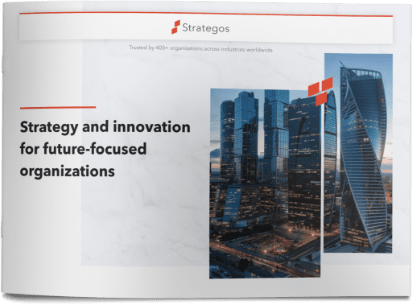The article was written by João Brito Martins – Head of Innovation at EDP and Co-Authored By Jose Alberto de Oliveira Pereira, Strategos and published previously on Gary Hamel’s Management Innovation Exchange.
Summary
Through the “Innovation Mentors” program, EDP Brazil is creating an internal innovation network across the organization. Each mentor is trained as a business and management innovator, acquiring new roles and responsibilities in the organization and working as an extension of the Innovation Department.
Context
EDP Brazil is a utility company with operations in generation, distribution and commercialization of electricity in Brazil. Controlled by EDP in Portugal, one of the main European operators in the energy sector, EDP in Brazil is one of the five largest private sector generators in the country. Currently, it has a total revenue of R$5.5 billion (~USD 2,7 billion ), 2,9 million customers, 2,700 employees and operations spread over 10 states in Brazil.
On listing its capital in July 2005, it signed up to the Sao Paulo Stock Exchange (BM&F Bovespa) which has strict rules on transparency and requires the highest standards of Corporate Governance. For the seventh consecutive year, EDP is a component of the Corporate Sustainability Index (ISE).
The energy sector in Brazil is highly regulated and very competitive, comprising hundreds of companies in the market. Although Brazil has one of the most expensive electricity prices in the world it has growing energy needs as the consumption increases every year. Moreover, there is upward pressure from the government and society for higher service quality and price reduction. As a matter of fact the Brazilian Federal Government has recently issued a new regulation, reducing electric tariffs by 16% on average.
Furthermore, recent technological developments, e.g. lower cost of solar PV and the development of smart grids, are a good signal that the energy sector is about to reach a paradigm shift. Actually, as the sector hasn’t gone through any significant technological disruption over the past 50 years and as the development of a new project is typically long, the culture of the sector presents resistance to rapid structural changes.
Triggers
The utilities sector in the world has been undergoing some transformations that will impact in the way the sector is managed, such as the development of the smart-grid technology, the advent of micro generation and the growing concern regarding energy efficiency. In addition, likewise Europe and the US we anticipate a liberalization movement in the Brazilian utility sector, typically granting consumers the option to choose among energy suppliers and thus pressuring these companies for more innovations in their products, services and business models. For instance, in Europe several countries have already fully liberalized the energy market, such as Portugal, Spain, UK, and Germany.
Additionally, the integration of the Y and Z generations in the workforce, bearing different habits and perspectives towards life, will force companies to offer challenging work, development opportunities, recognition and entrepreneurship programs if they want to attract and retain talented young professionals. In Brazil, this need is strengthened by increasing competition for skilled professionals. Finally, technology developments are changing relationship and work models, exemplified by a 30% growth of home office in Brazil. Envisioning a completely new energy sector that will arise as well as the need for new management practices, EDP Brazil developed the “EDP 2020 Vision”. It was conceived as a strategic planning exercise that defines the main areas of development in order to prepare the company for the paradigm change as well as for the labor market disruptions that will occur in the near future.
The “Innovation Mentors” program is one of these initiatives that contribute for the accomplishment of the goals defined by the “EDP 2020 Vision”. Focused on the management and business model innovation, the mentors should act as “innovation ambassadors” across the organization. This network is considered unique as it is an informal structure not consisted of people from the innovation department, but yet, consisted of people from different backgrounds and hierarchical levels who crave to have a more active role in the organization, share their expertise and contribute to reinvent the energy business and the organization. More than promote and “enforce” innovation from top down, the objective of the Innovation Mentors program is to generate and create innovative ideas from bottom-up. It is the reinvention of the organization from the bottom and not from the top as it usually happens.
As guidelines to accomplish this reinvention, EDP Brazil has defined different dimensions of its management model to be challenged:
- Organizational structure – creating a flatter organization with less hierarchical levels;
- Activities management – promoting autonomy and the spontaneous suggestion of projects to be implemented by a network of collaborators and external partners;
- Decision making system – spreading decision making through different actual hierarchical levels within the organization and taking into account both internal and external inputs for decisions;
- Incentives system – willing to have employees that embrace these tasks not as part of their job description, but as a mission aligned with the company’s goals.
- Physical workplace – developing a space that favors openness and collaboration among employees, complemented by practices and technologies that can give them the flexibility to work from everywhere.
Working on these different dimensions, EDP is pursuing three main goals: i) cutting down bureaucracy; ii) fostering individual and community initiative; iii) opening up the company, both internally, by breaking barriers among its different business units and externally, by further levering stakeholders such as suppliers and universities in its innovation activities.
The consolidation of an internal innovation network is crucial to achieve a critical mass so that EDP can reach the goals beyond this new management model. The mentors will have double responsibilities (i) their formal activities and (ii) their innovation assignments where they have to work as “innovation cells” across the organization, generating and supporting the implementation of the innovation projects.
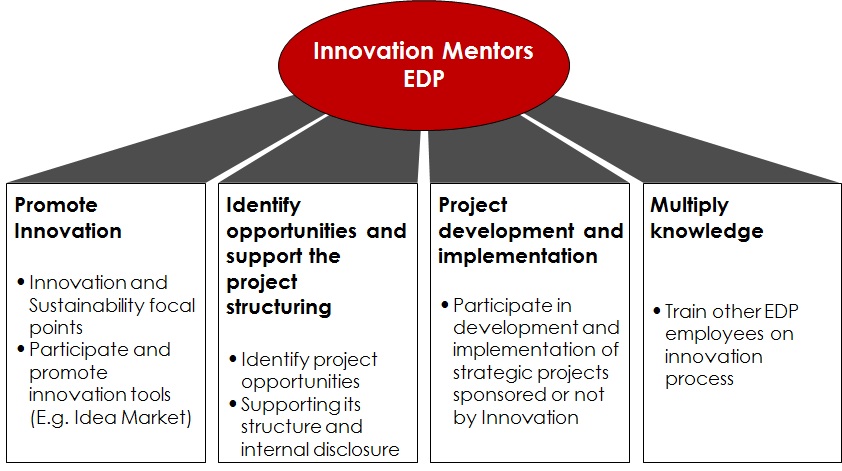
When a mentor identifies an opportunity for improvement he has to activate the network in order to search for support to design and improve the idea in a value proposition. Every value proposition or project has to be approved internally. Once approved, a project team, a project schedule, an internal sponsor and project goals are defined. Every project approved has its implementation monitored by the innovation department in order to ensure that the benefits and the impact of the project are measured. Currently there are 3 projects being implemented in the organization with the innovation mentors’ participation.
Key Innovations & Timeline
One of the key innovations is that this network is informal and should work as an autonomous “animal” inside the organization. The people involved in the project have to believe in it and have to work for it. At EDP we believe this is a good example of how the organizations of the future will work i.e with “liquid” departments being created in the organization in a continuous reborn movement
Another main innovation is the profile diversity this group must have. EDP aims to have different levels of seniority and a wide range of backgrounds in an attempt to use diversity to generate more and better ideas. These mentors will have a key role in promoting innovation internally and disseminating innovation concepts, tools and methodologies, by training other colleagues, helping to multiply the network and supporting the network growth. On top of that, each mentor will have the chance to identify opportunities leading to business or management model innovations. To reinforce the search for results the mentors may have to take an active role in selling these ideas internally and to implement the resulting innovation projects. The network only will survive if its members work for it.
In an analogy with the quality and six-sigma movement, EDP is assigning different color belts to its innovation mentors (white, green and black) according to a dynamic credits system reflecting their participation in the company’s innovation efforts. Each belt has its corresponding set of Roles & Responsibilities (more information on the credit system in the attached PDF), based on the “proficiency level” that each member achieved during the training phase or the credits collected in the year.
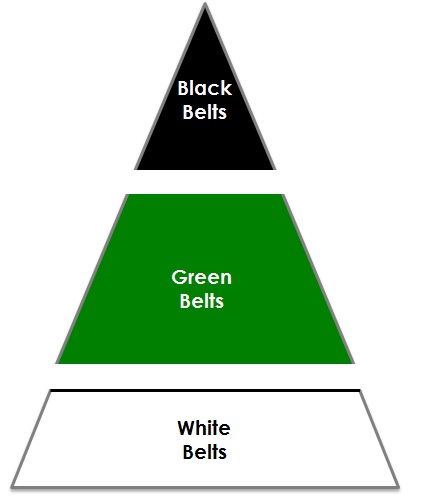
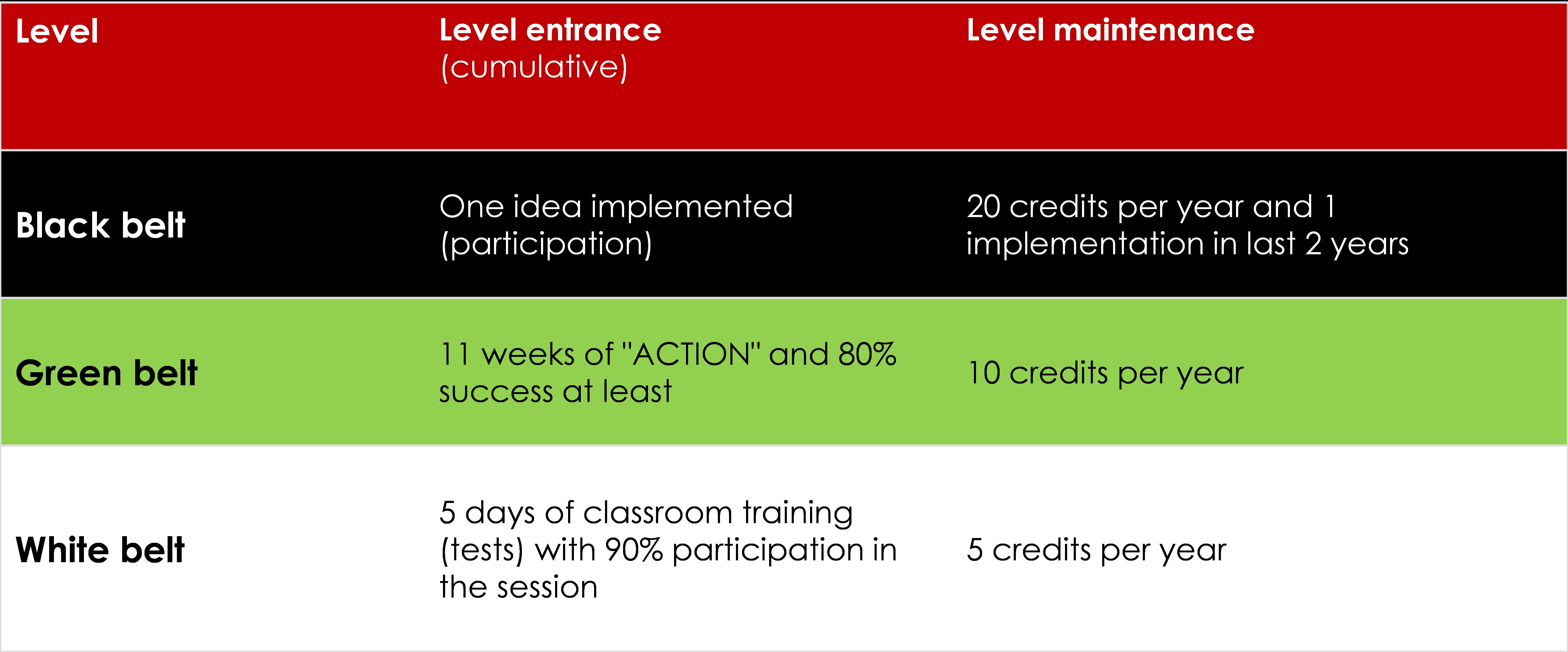
The first test of the “Innovation Mentors Program” completed during 2012, consisted of a pilot project with about 30 participants, aimed at training each participant as a business and management innovator. Mentors where trained on innovation principles, business and management model concepts and used a set of innovation methodologies and tools to grasp innovation challenges identified by EDP’s management. Besides, throughout the development of the first round of the program the mentors are already challenging some of company’s current management practices and embracing several projects that will produce innovation in its management model by creating an internal innovation network.
The participants were split into four groups so that each of them could have a clear idea of how to apply the innovation process and simultaneously respond to the specific challenge of the organization.
- Business challenge 1: “How to develop business opportunities in the energy efficiency services area for B2B clients?”
- Business challenge 2: “How to capture the potential of solar energy in the B2C segment?”
- Management challenge 1: “How to reduce bureaucracy in the organization and increase its effectiveness?”
- Management challenge 2: “How to integrate, motivate and develop the new generations that are joining the company?”
The mentors followed a process developed by the strategy and innovation consulting firm Strategos with three main phases: i) A discovery phase where challenges with a fresh and unique perspective were created; ii) An ideation phase, where those insights where “broken up” to initially generate hundreds of new ideas, subsequently turned into more solid concepts i.e value propositions; iii) a development phase, where the most promising value propositions where stretched, solidified and developed, resulting in a set of new business opportunities and innovations to the EDP’s management model, each of it having its implementation and experimentation plan. Through this process, 100 insights, almost 1.000 small ideas and 26 value propositions (10 business propositions and 16 management propositions) were created.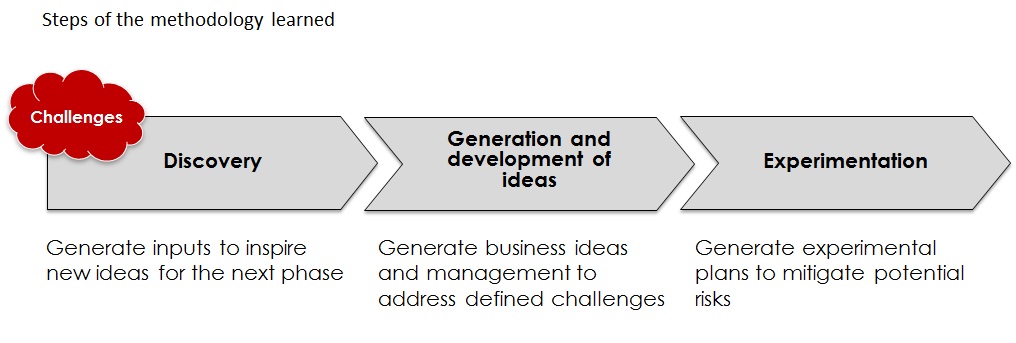
The Discovery space, a tool to support the generation of ideas, was crucial not only to produce the insights that were used in the following phases but also to break some myths regarding innovation and create a new mindset already being disseminated within the company. To begin with, the participants were provoked to challenge their industry’s and company’s orthodoxies i.e the rules that have been shaping the way EDP approaches its business and getting things done within the company. They were trained to generate insights from consumers and other stakeholders, such as the company’s employees, thus uncovering their unarticulated, non verbalized and unmet needs. They also used exercises and tools to identify the core competencies of EDP which could be levered to explore new business opportunities. Finally, the mentors were trained to identify trends in business, society, technology, etc and anticipate discontinuities that would impact their business and management model.
In a nutshell, mentors were trained to look at their business and the world through a new set of lenses. This resulted in a fresh perspective that sets truly differentiated ideas and projects. In the future, it is expected that the network itself generates some of the projects that the EDP group will develop in terms of innovation, either business developments or management innovations, creating a change movement from inside the company.
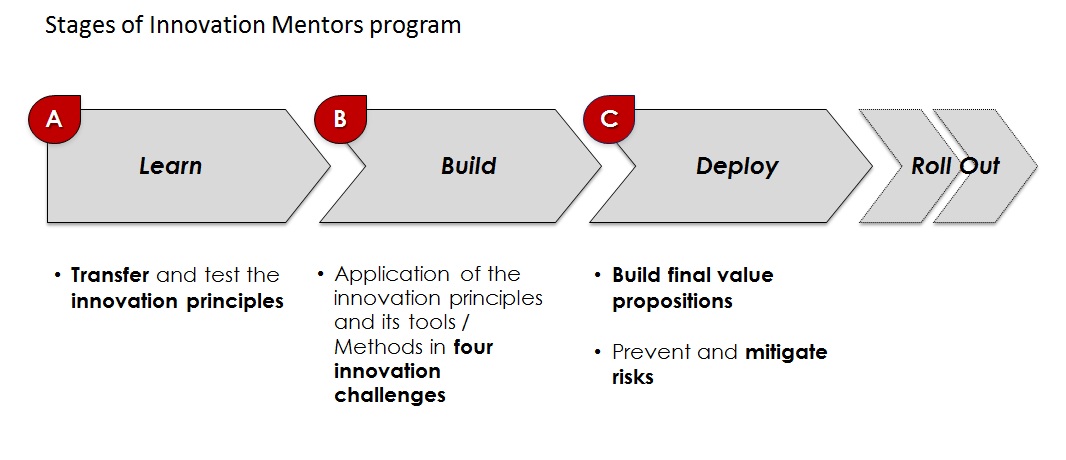
Challenges & Solutions
One of the challenges in this program was the selection of the participants. We decided for a mix of volunteers and nominations from managers to be sure that we would have a group of committed people representing EDP’s main areas and business units, ensuring a diverse group able to generate valuable and differentiated ideas.
Another important task was to define a set of challenges for each subgroup that would not only promote the learning of innovation concepts aligned with EDP’s strategic agenda but also create a short term impact in the company in order to ensure quick gains. We got to the final list of challenges through interviews with top and middle management and validation with top management.
One of the key challenges we have faced was to keep all participants committed and motivated along the program considering their busy agendas, especially in the phase of developing and creating value propositions. We tackled this challenge by doing several presentations to some top and middle managers when we discussed and collected ideas/areas of improvement to guarantee steady continuity within the company and define a clear work plan and milestones. To ensure that each group was moving forward to address its challenge we had touch points with the groups through weekly work meetings.
Benefits & Metrics
One of EDP’s hard benefits of this first phase of the “Innovation Mentors” was the creation of a pipeline of opportunities for both its business and management models. EDP has now 10 new business propositions that better prepare the company for the changes expected in the energy sector. One of these propositions is already being implemented and as a result of it EDP Brazil is developing an Energy Services Company (ESCO) to explore opportunities in energy efficiency, grid systems management and other energy related services. For instance, the energy efficiency for buildings is an estimated R$1,4billion market in Brazil.
As mentioned, the “Innovation Mentors” program developed 16 propositions for innovations in the different dimensions of EDP’s management model and 2 of them are being implemented. A proposition for a new workplace design with rotational workplaces and a clean desk policy, among other changes, resulted in a reduction of more than 10% in the space needed for the new EDP’s headquarters in Sao Paulo corresponding to R$ 600,000 (~USD$ 295,000) of annual savings in rental expenses. Another project in execution changes the way small expenses like trips, meals etc are approved and reimbursed. It reduces bureaucracy and frees management from more than 23 weekly hours of non-added value activities as the time spent by the management team.
This program was also very important to create innovation capacity within the company. EDP has now 30 employees trained in innovation, 8 and 16 of them with green belts and white belts, respectively. There are also relevant soft benefits from the “Innovation Mentors” program. It created a new mindset and increased the innovation awareness in the organization. Furthermore, it helped to disseminate a new innovation tool set that EDP can use to make innovation happen.
Lessons
It is possible to sum up all the learning we acquired during the first edition of the program in three main lessons.
The first one is how to balance representativeness of different areas of the organization and to have committed and motivated employees towards innovation and change on board. On one hand it is better to have highly motivated people that have demonstrated interest in joining the program as their commitment and availability is much higher. On the other hand it is important to guarantee that there is a diversity of profiles in the group ensuring that each subgroup is able to move forward and create and develop robust value propositions.
The second lesson is that innovation and especially change are not easy subjects to deal with and that it takes some time for the organization to challenge the status quo and to widely adopt these practices. Although several good ideas and value propositions were generated, it takes some time for people to start creating good ideas with business acumen. Having said that, EDP needs to continue developing and promoting these programs so that innovation people get used to the process and start incorporating the innovation process to their daily activities. We strongly believe that only with regular “training” and exercise of innovation will people better understand the process and, in the midterm, start generating highly valuable ideas for the organization as well as for them.
Finally, top management support is fundamental for the success of the program, not only to reinforce the sense of urgency and the need of the organization to adopt “innovation” as a corporate value but also to empower the group creating an additional motivation for the participants. It is also very important that the top management is aware that these programs are not expected to generate big disruptions in the short term. This is a marathon and not a 100 meter run.
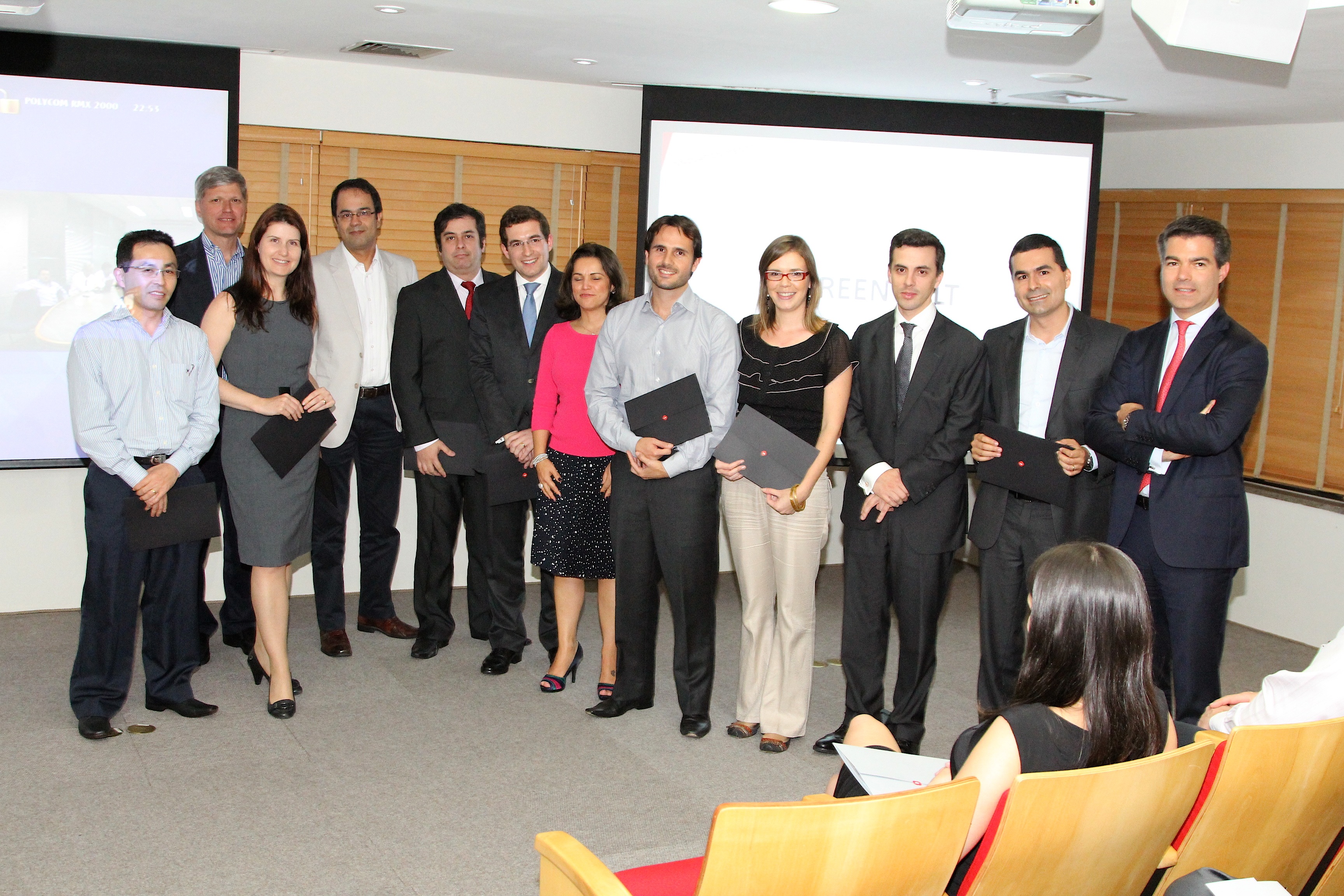
Based on this pilot project, EDP is now preparing a second round of the “Innovation Mentors Program”. It is composed of a set of initiatives to activate and involve people aiming to promote continuous innovation growth across the organization.
Credits
EDP’s employees that have participated in the first edition of the Innovation Mentors Program that risk to be involved in the project even without knowing well what would be the benefits. Whithout them this success story would not exist.



